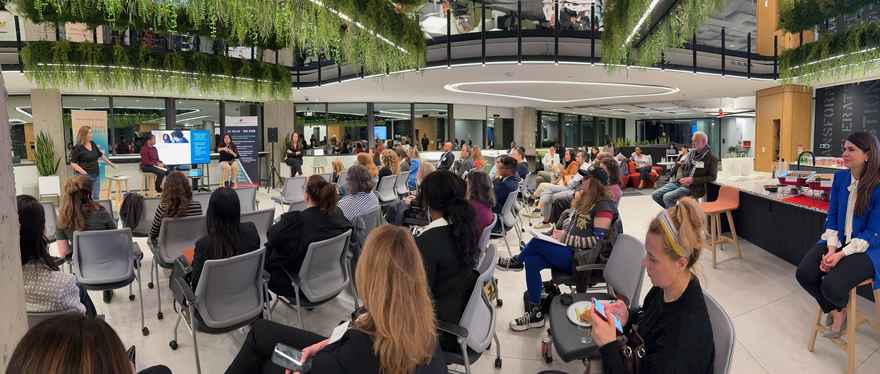Is Venture Funding Right for You?

On March 5, Arlington Economic Development (AED) kicked off its “Elevate Your Venture: Arlington Female Founder Series” powered by Citrine Angels (Citrine). Held at Northeastern University’s Arlington campus, it was standing-room-only as entrepreneurs and investors packed the space to hear leading fund managers provide valuable insights on the pros and cons of accepting venture capital.
Aurelia Flores, co-founder of Citrine and an Investment Director at Virginia Innovation Partnership Corporation (VIPC), moderated a conversation with Shalanda Armstrong of 100KM Ventures; Seda Goff of Flintlock Capital; and Himalaya Rao-Potlapally of The BFM Fund.
Questions were abundant as the panelists discussed what it means to be venture backable and points to consider when determining if you want to pursue money from venture capital (VC) firms. The fact is most businesses are NOT venture backable; approximately 3% of all businesses can even pitch to get venture funding from angels and VCs. As a point of comparison, most businesses on the Fortune 500 list never received venture funding - so venture capital is not a measure of success.
In order to be “qualified” for venture financing you should have:
- High growth - a minimum of double and/or triple YoY growth
- Very high gross margins
- High exit multiples - able to be sold for ~10x (plus) revenue
- A path to be grown to $10-50M and sold within 5-8 years
- A business that is NOT a purely services (could be tech-enabled)
For many companies, venture capital may NOT right for them if:
- They aren’t ready to focus on preparing for an exit
- They don’t want to answer to investors
- They want to build a company and stay in a leadership role long-term
- They want to raise money by an alternative means at this stage, such as through grants, crowdfunding or strategic partnerships
In contrast, there are reasons a company might want to pursue venture funding:
- They are in a cash-intensive business area and need money to grow
- The founder is a “starter” by nature and is ok with being pushed out as CEO fairly early on
- They know what needs to happen and are ready to grow
- They have built a strong non-venture backed business and now see a way to make it high growth
VCs spend all day every day understanding other companies’ business models. It is useful for startups to learn the venture capital business model as well. As several of the panelists noted, they don’t get a big payday until an exit - and even then, there are many factors.
First, most funds primarily use other people’s money, raising money from Limited Partners with a promise and fiduciary responsibility to follow a specific investment strategy, and return the money within a set time. There is a set investment period, and it’s important to know where a VC is in the fund life cycle as well as their specific approach and focus.
Most importantly, venture capital investment funds are not returned to an investor until an exit - which is why VCs are focused on high growth and an exit from the beginning. By contrast, angel investors such as those with Citrine Angels typically fund with their own money. But, again, due to the high risk nature of the type of investment, angels want to get a large exit within a relatively short period of time (5-7 years).
How do you know what a specific VC wants? Join us for our next panel in the Elevate Your Venture series on May 22.
Meanwhile, it’s important to note there are a LOT of other types of funding out there that are not reliant on angels or VC investors.
Below are a few examples of where capital can come from.
Sales (Your Customers)
Direct customer sales is a company’s best, earliest and most instructive type of “investment.” If a company is getting sales, they’re getting real-time feedback that what the company offers is valuable and to whom.
Customers might be individuals or businesses, including government customers.
Another form of sales can be to strategic partners. For example, if you are a fintech company, you may want to enter into a pilot program with a bank.
If a company is early on and in consumer goods, pop-up shops is one type of format where a company can ‘try out’ sales without a lot of risk.
Federal and Local Grants and Programs
There are a number of federal and local grants available for early stage businesses. Some examples are below:
- SBIR/STTR grants
- NSF and NIH Grants
- Commonwealth Commercialization Fund (CCF)
- Arlington Economic Development and the Arlington Innovation Fund
- Fairfax Founders Fund
Keep your eyes open for grants from other organizations. There are a number of them. For example, Black Girl Ventures just did a Together Grant, and The Agora Initiative just launched a competition. There are many others.
Note that the sources of capital below - unlike grants or sales - may have an impact on the capitalization of a company and future investors will consider this.
For example, if a company has received investment early on, future investors will ask for a “cap table” - a document that clarifies who owns what percentages (or has claims to ownership) for a company. Cap table issues can completely derail future financing if not done correctly. Similarly, if a company has a lot of debt, investors may not be interested in investing money simply to pay back a loan.
The panelists mentioned not taking outside investment of any sort without consulting with expert lawyers and accountants who understand this space. Nevertheless, it’s important to know other capital sources.
Loans
Additional Avenues
- Rewards-based Crowdfunding (GoFundMe, Indigogo) can be a great tool for the right product and to show customer enthusiasm
- Investment Crowdfunding - to be distinguished from rewards-based crowdfunding - can be structured in a variety of ways (WeFunder, Republic). This is either equity or loan-based and has the same considerations as other types of loans or investments.
- Friends and Family can be great support (but note the caution re cap table above)
- Pitch and innovation competitions
- Talk to your local Small Business Development Centers! Programs like Innovation Commercialization Assistance Program (ICAP) help small businesses grow - whether or not venture backable.
- There are a lot of incubators and accelerators out there and it often takes going through several programs to really lock down your business model and go to market strategy!
Curious to learn more? Review the presentation here, including helpful links to grant opportunities.
